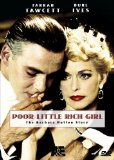| Reviews & Columns |
|
Reviews DVD TV on DVD Blu-ray 4K UHD International DVDs In Theaters Reviews by Studio Video Games Features Collector Series DVDs Easter Egg Database Interviews DVD Talk Radio Feature Articles Columns Anime Talk DVD Savant Horror DVDs The M.O.D. Squad Art House HD Talk Silent DVD
|
DVD Talk Forum |
|
|
| Resources |
|
DVD Price Search Customer Service #'s RCE Info Links |
|
Columns
|
|
|
Poor Little Rich Girl: The Barbara Hutton Story
Just too, too much. A&E and Granada International have released the 1987 NBC miniseries Poor Little Rich Girl: The Barbara Hutton Story in a 2-disc, expanded edition. This particular version of the Farrah Fawcett starrer is the longer European cut (clocking in at almost 5 hours), and while I always like to see the complete versions of these particular kinds of miniseries (the U.S. version back in '87 ran closer to 4 hours long), there's just too much of the same thing going on here. One scene after another chronicles the apparent misery that was heiress Hutton's life in this unimaginative (yet expensive) production, creating in the end a sense of overkill for the mini's one-note message: money ain't everything.
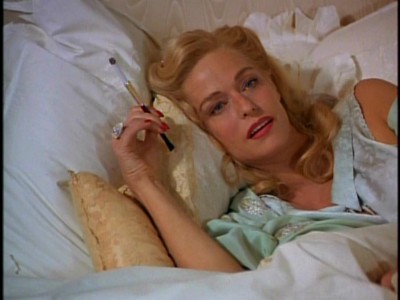
Barbara Hutton (Farrah Fawcett), born in 1917, was the granddaughter of Frank W. Woolworth (Burl Ives), the legendary American business magnate who, through his successful "five-and-dime" Woolworth thrift stores, pioneered such retail standards as fixed prices for items and self-service goods on display (as opposed to the standard practice of having all merchandise behind a sales counter). Hutton, raised in a stifling, isolated luxury, had the double misfortune of unstable parents. Her father, Franklyn Laws Hutton (Kevin McCarthy), the co-founder of the investment giant, E. F. Hutton, was a drunk and a womanizer whose behavior caused Hutton's mother, Edna Woolworth (Toria Fuller) to commit suicide - with six-year-old Barbara discovering the corpse. Her father, distant and uninterested in raising the child (Barbara overheard her father stating he never really wanted her, and that most children are born "out of a bottle of whiskey"), passed the child off to be raised by her aunts and F.W. Woolworth - a calming paternal influence on the child whom nonetheless contributed to Barbara's later neuroses by telling her that only "magic makes the soul alive," and that there is "only 'now'," and to live life accordingly. Indeed, Barbara would take this advice to heart, eventually believing in nothing but gratifying her own selfish needs, while being forever disappointed with the other people in her life who didn't constantly provide "magic" for her.
With equally eccentric cousin Jimmy Donahue (Bruce Davison) as her only close companion growing up (they both pledge a pact to "get through life as quickly as possible"), Barbara's life became increasingly sheltered from the realities of life outside the realm of her wealth. On her 21st birthday, she inherited a third of F.W. Woolworth's estate, which her father had doubled with careful investment, netting her a personal fortune of almost 50 million dollars (which in today's money would be well over a billion dollars) - back when there were very few millionaires in the world, and back when a million dollars really meant something. At 21, Barbara Hutton was one of the 2 or 3 richest women in the world.
What followed, unfortunately, was a series of repeated patterns for Hutton, who would find undesirable men and then marry them, paying them off when they failed to live up to her needs. Her first husband, Prince Alexis Mdivani (Nicholas Clay) later admitted he never loved her, and that their engagement was orchestrated by his money-hungry sister, Roussie (Carmen du Sautoy). Her second husband, Count Curt Heinrich Eberhard Georg von Haugwitz-Hardenberg Reventlow (Amadeau August), was a sadistic control-freak who physically and sexually abused Hutton. Together, they would have Barbara's only child, Lance Reventlow (Robert Holman, Jonathan Brandis, Linden Ashby), who was essentially ignored by his mother (much like Franklyn ignored Barbara growing up), and who would ultimately break all ties with his mother. Her third marriage to movie superstar Cary Grant (James Read), could have provided Hutton with the stability she so obviously needed (Grant briefly raised Lance Reventlow as his own, and remained close to the boy even though his mother didn't). But Hutton's self-destructive personality pushed Grant away (tellingly, he was the only ex-husband to refuse Barbara's offered pay-off), and led to more useless, ill-fated marriages with impoverished, faux-princes who took advantage of her for her money. By the end of her life, Hutton was giving away priceless baubles and cold cash to strangers for no reason (as well as paying outright for companionship, both sexual and platonic). After the death of her son in 1972, Hutton's already precarious emotional state (as well as her financial situation) spun increasingly out of control, exacerbated by apparently shady business deals by her life-time lawyer, Graham Mattison (David Ackroyd). In May, 1979, she died at the age of 66, with only $3,500 left in her various savings and checking accounts.
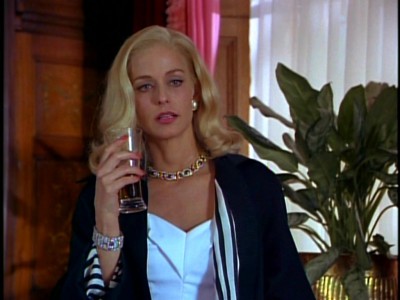
The difficulty the creators of a miniseries like Poor Little Rich Girl: The Barbara Hutton Story must have, is making their lead protagonist sympathetic in some regard or aspect of her life, so we can carry through the four or five-hour length of the film with a degree of engagement with the material. And at the beginning of Poor Little Rich Girl: The Barbara Hutton Story, we certainly feel for the little girl Barbara Hutton whose life was irreparably warped not only by the money she inherited (it provided the isolated context of her beginning life, keeping her isolated and alone, causing her to doubt who her real friends were, as well as providing the means to "buy off" her troubles later in life), but also the shady characters that populated her life. The film is quite good at setting up this "perfect storm" of negative influences that would set Hutton on her life-long self-destructive course, with the screenplay carefully setting up not only Hutton's disastrous formative years with her father (of whom Barbara later admits she learned all her bad habits from), but also the unpleasant effect having that much money had on the little girl who just wanted a parent or a friend to love her for herself.
But as Poor Little Rich Girl: The Barbara Hutton Story grinds on and on, past the second and third hour and into the final fifth, we've gotten that message loud and clear, and yet we're pummeled with it to the point where the various indignities Barbara suffers (as well as perpetrating on others) start to wash over us. This mini thinks "repetition" is the same as "thoroughness." I'm all for opulence in both the physical production of a film, as well in the construction of a screenplay (in fact, I celebrate that kind of largesse), but even DeMille kept his epics under four hours long. And unlike that director's instinctual appreciation of melodrama, Poor Little Rich Girl: The Barbara Hutton Story, directed by the erratic Charles Jarrott, tries to throw everything up on the screen, but without the slightest bit of engagement once the film turns to the adult Barbara's troubles. Superficial pain and gloss are what interest Poor Little Rich Girl: The Barbara Hutton Story, not insight. And once we get Hutton's number (which gradually becomes negative after we see friend after friend correctly diagnosis what's wrong with her - to no avail), our sympathy for her drops dramatically.
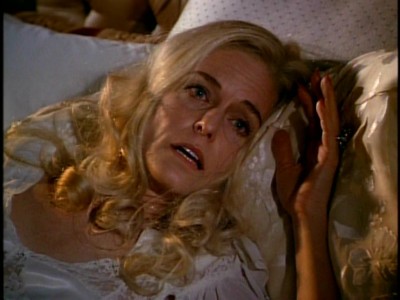
Constructed like a soap opera, Poor Little Rich Girl: The Barbara Hutton Story presents scenes of opulent splendor (the sets and the endless costumes indicate that a lot of 1987 money was spent on this mini) for our perusal, like a selection of canapés on a plate, encouraging us to indulge in a bit of guilty schadenfreude at the sight of a woman who had seemingly everything, but who in her own words, felt like "worth millions, worth nothing." And that limited approach would have been fine, if those scenes would have been presented with even a dash of verve or originality. Painful spectacle is fine, if the director and screenwriter have the stomach to present it as "pleasurable" for the audience. If you're going to wallow, do it. Don't be tasteful or ashamed of it. Go for the throat and exhibit some passion. But Poor Little Rich Girl: The Barbara Hutton Story just rolls on and on, like some slow-going, imperturbable ocean liner, presenting one detached scene after another of Farrah Fawcett suffering - to little avail.
And everyone is to blame here. Screenwriter Dennis Turner (Dynasty, The Colbys, Leona Helmsley: The Queen of Mean), working from a biography by that none-too-well-thought-of author, C. David Heymann, betrays his nighttime TV soap opera and sensationalistic movie-of-the-week roots all throughout Poor Little Rich Girl: The Barbara Hutton Story, as the script glosses over real character revelation to focus on scene after scene of showy suffering (second-billed David Ackroyd - who's always excellent - is reduced to little more than a cameo, when his shady Graham Mattison character should be front-and-center). Director Jarrott, of whom I've written before, isn't exactly the most dynamic director, even in his more successful outings (Anne of a Thousand Days, Mary, Queen of Scots). But Poor Little Rich Girl: The Barbara Hutton Story plays more like his disastrous big-budget remake of Lost Horizon or his numerous TV movies where head-and-shoulder close-ups rule, creating a claustrophobic, cramped feel to the dramatics. It also doesn't help that he fails to generate much excitement in his actors' performances, either. By this point in Fawcett's career, she had successfully reinvented herself as the go-to actress for "serious" TV movie fare, leaving behind the "jiggle TV" of her phenomenal one season on Charlie's Angels - as well her subsequent failed big screen movie career. But as with many actresses like Fawcett who gained attention in light, frivolous entertainments, only to later seek out "respectability" with more dramatic roles, her technique turned from sunny to glum, with a locked-down "dourness" imitating true dramatic range. And such is the case in Poor Little Rich Girl: The Barbara Hutton Story with Fawcett, as well. She just doesn't provide enough reach for us to appreciate the genuine pathos (and selfishness) of Hutton's life. And if I can't buy Fawcett as suffering Hutton for one hour, it doesn't get any better after five.
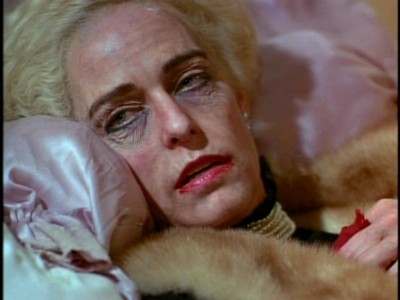
The DVD:
The Video:
Seeing as this particular transfer comes from Granada International, I'm wondering if the occasional jiggering I noticed in more busy scenes was the result of PAL conversion issues? Overall, the full-frame, 1.33:1 video transfer for Poor Little Rich Girl: The Barbara Hutton Story is acceptable, if not spectacular. The picture can be soft at times, and the colors slightly faded, but it looks about as good as I remember seeing it first-run on TV.
The Audio:
The Dolby Digital English 2.0 stereo mix for Poor Little Rich Girl: The Barbara Hutton Story can at times drown out the dialogue with the music cues, but for the most part, it's agreeably strong. There are no subtitles or close-captions.
The Extras:
Thin text cast biographies are the only extras here. Worthless.
Final Thoughts:
Poor Little Rich Girl: The Barbara Hutton Story would seem to be a natural for the long-format TV miniseries genre. The story has everything: power, wealth, tragedy, heartbreak - and it's all true. But this 1987 mini, released in its full 5-hour running time, substitutes repetition for insight, presenting one scene after another, shot in boring head-and-shoulders close-ups, of Farrah Fawcett glumly suffering as the unhappy socialite. It's interminable. You can skip Poor Little Rich Girl: The Barbara Hutton Story.
Paul Mavis is an internationally published film and television historian, a member of the Online Film Critics Society, and the author of The Espionage Filmography.


|
| Popular Reviews |
| Sponsored Links |
|
|
| Sponsored Links |
|
|
| Release List | Reviews | Shop | Newsletter | Forum | DVD Giveaways | Blu-Ray | Advertise |
|
Copyright 2024 DVDTalk.com All Rights Reserved. Legal Info, Privacy Policy, Terms of Use,
Manage Preferences,
Your Privacy Choices | |||||||









